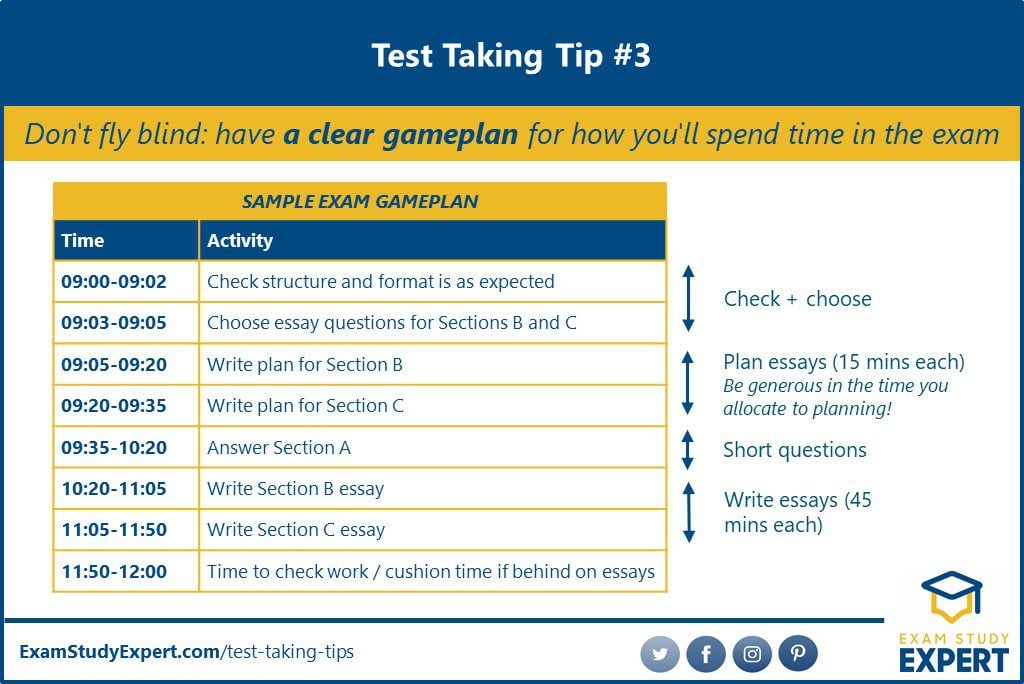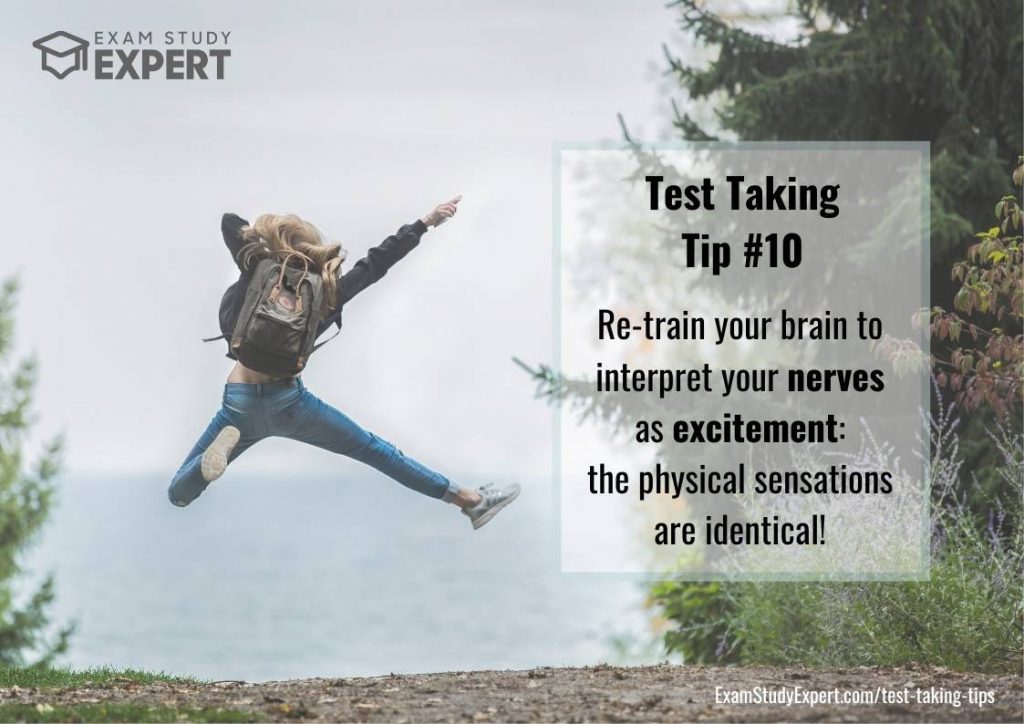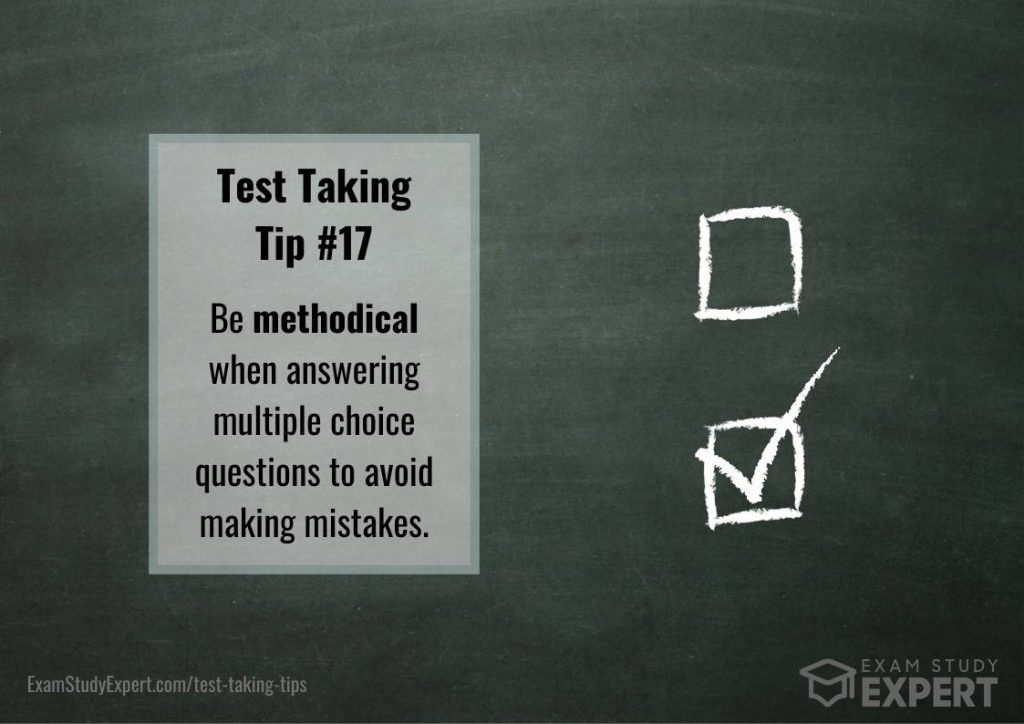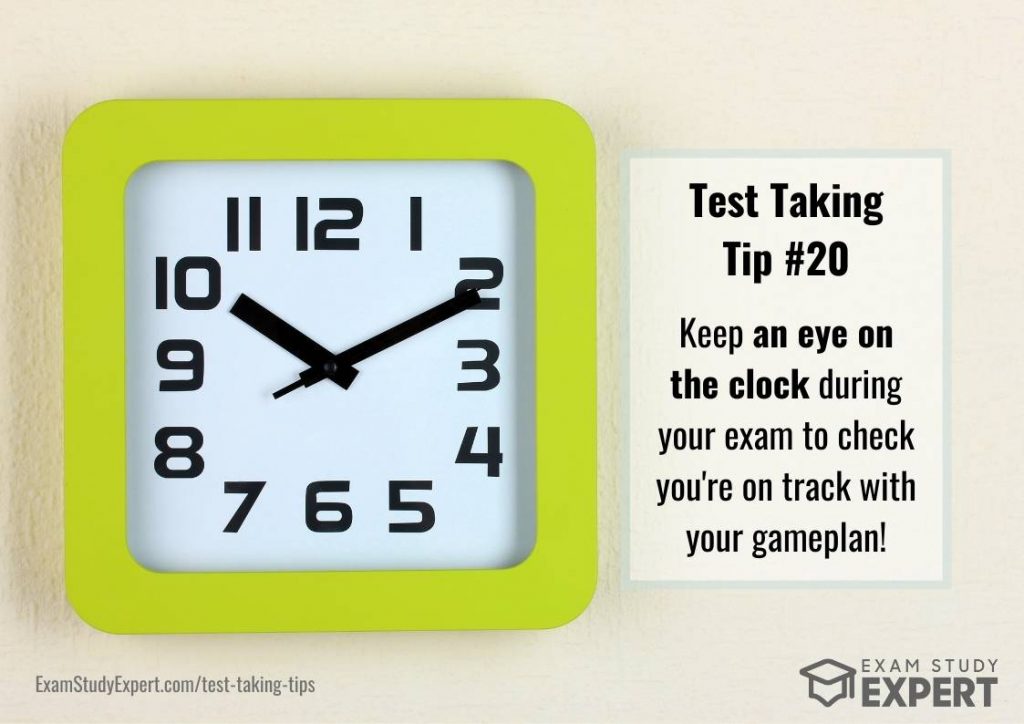I’m a Cambridge-trained memory psychologist and experienced exam coach, and the science behind test taking is one of my all-time favourite topics. Let’s beat the system with 23 of my ultimate test-taking tips to help you maximise your marks, combat nerves and improve your time management and confidence!
By William Wadsworth, the Cambridge University trained cognitive psychologist and specialist in how to study smarter, not harder. He leads the world’s largest research study on use of effective learning strategies, is regular exam prep expert for The Times, and hosts the Exam Study Expert podcast, with 1 million downloads to date.
Additional research, graphics and article review by Dr Kerri-Anne Edinburgh
Our mission is to provide high quality content to help learners ace their exams with confidence. To ensure our articles meet that high standard, we follow a rigorous editorial process throughout: from ideation to review. To learn more, please see our Editorial Policy.
If you’d prefer to listen to these test-taking tips in podcast form, you can! Simply click right here:
Part 1: Tips that ensure you’re prepared
As Benjamin Franklin once said: “Failing to prepare is preparing to fail.” Make sure you’re as prepared as possible to take your tests by implementing these seven tips:
1. Immunise yourself
One of the most important tips for test-taking success is to:
Take a vaccine against exam day nerves by doing regular mock tests!
Leading up to the exam itself, recreate exam day conditions (as accurately as you can: grab a timer but leave your books!) and take some mocks.
You’ll practise your exam-taking tactics, build your confidence, and work on your time management.
And mocks are superb for learning how to soothe your nerves – in fact, the more you don’t want to take a mock test, the more you need to take one!
2. Plan the big stuff…
Have a really clear plan for your exam period.
This applies even if you’ve just got one exam: think about how you’ll use the final 24-36 hours before the exam!
And it’s especially important if you have multiple exams, say over a week or more.
You’ll want to draw up a master timetable that includes all your exam timings clearly laid out but also a timetable for final preparations for each paper.
Make all those decisions in advance, so that when you’re in the midst of exam week, you know exactly what you need to do and when!
You can find much more detailed guidance on this, plus a printable or digital template for this as part of your bonus pack, if you pick up a copy of Outsmart Your Exams.
3. … and the small stuff
Don’t fly blind: it’s just as important to make a clear gameplan for how you’ll spend your time when you’re actually in the exam.
Make sure you know the time available to you and the sections of the exam paper.
Then ask yourself: How many minutes am I going to allocate to each section?

Decide on the time management strategies you’re going to implement (see Part 3) and make sure you include them! And practice with some mock exams to make sure your timings work.
If you’d like some exact guidance on how to set up the best exam gameplan for you, head over to Chapter 20 in Outsmart Your Exams – it’s got exactly what you need!
4. Taper like a pro
Professional athletes taper their training in the week leading up to a big race, which means they train less and rest more, so their legs are fresh and not sore come the big day.
You should think about doing the same.
Pro tip: the week before an exam isn’t the time to start pushing yourself, so study steadily and make sure there’s juice in the tank for exam day!
5. The right tools for the job
Know the kit you need for each exam – stationery, calculator, ID cards, and so forth.
Follow these steps to make sure you’re definitely prepared:
- Write up a checklist several days in advance
- Make sure you own all the items on it
- Assemble the list the night before the exam
You’ll be feeling less stressed on the morning of your exam!
6. Stay hydrated
Bring a bottle of water into the exam.

I suggest defaulting to a 500ml bottle – that’s just under a pint.
That’s big enough to quench your thirst over a long exam, not so large that you’ll over-drink and end up running to the loo too often!
If it’s really hot, and especially if it’s a long paper, up it to a 750ml bottle!
Make sure to put it in the fridge the night before so it’s nice and cool for exam day.
7. Get your mind and body exam fit
Get yourself in top condition so you’ll perform at your best!
If energy and stamina is a problem (especially for long papers):
- make sure you are physically fit through regular exercise and having a good sleep routine.
If focus is a problem:
- build up your concentration muscle through a morning meditation practice.
Top tip for prep before taking tests: looking for a way to improve your focus and and relieve your studying stress today? I often recommend Headspace as a great tool for students (and teachers!): learn more about why in my thorough, honest review!
Part 2: Tips for developing a champions mindset
Master your test taking mindset by channelling your inner champion! How? Follow these four tips:
8. Walk the walk
Even if you don’t feel like a top performer on exam day, pretend you are and act accordingly.
No one will know the difference but you, and you might even convince your nerves!
9. Bring your A game
Be greedy for marks!
Leave no stone unturned in your quest to score every last point you can – within the time available, of course.
Make sure you know which test taking strategies and tricks you’ll be using in the exam and implement them confidently!
Why not get your A game pumped and ready with:
- episodes of the Exam Study Expert podcast on exam techniques, exam week hacks, and memory and stress
- a copy of my Exam Success Cheat Sheet: for all my top tips in an easy to understand, beautifully illustrated format!
10. Re-train your nervous brain
If you’re feeling nervous, use this tip – it’s one of my favourites for a confident test-taking mindset!
Remind yourself that the physical sensations of nervousness are identical to the physical sensations of excitement.

We’re talking sweating palms, breathing faster, heart beating loudly…
All that’s different is how you choose to interpret those sensations.
Choose to interpret them not as signs of nerves, but instead as signs you’re body is excited, and primed to perform!
Learn about your brain chemistry when you’re stressed in this awesome podcast episode.
11. Work the problem
Remember, when it comes to taking tests, it’s often the case that the problem is hard because the problem is hard.
There is a mechanical solution that doesn’t rely on your genius and creativity!
So simply focus on putting one foot in front of the other, being methodical, and working it through, one step at a time!
And if in doubt, start by writing down what you know, based on the question and from your own knowledge.
You can do this – I know you can!
Part 3: Tips to help you master answering the questions
Let’s get down to the core of your test-taking performance with these next seven tips. Want to know how to avoid those silly mistakes? Read on!
12. Hyperfocus
Fun fact: when we read, our eyes don’t focus on every word. Instead, they move in jumps called saccades, focusing once every few words.
That’s dangerous in an exam, because you could skip over a key command word or key bit of data in your haste.
It happens all the time AND can cost many marks!
So force your eyes to slow down and be systematic by reading with a pen in your hand, underlining key words and commands as you go.

This is often an under-used tip for test-taking success but it will serve you well in combatting stress and nerves as you answer!
My friend Alex Porush refers to this as “hyper-focusing” – I love this term.
13. Order matters
Be strategic about the order you answer the questions in.
Because the order of the exam paper is not necessarily the best order for you to tackle it in!
There’s a whole chapter on this in Outsmart Your Exams, because this point alone can bump your grade quite dramatically if done well.
But in short, you want to think about whether you’re:
- Starting with easy stuff to ease you in
- Starting with hard stuff while you’re fresh
Or my personal favourite:
- Starting by getting all your thinking and remembering done up front, especially for planning long essay-style questions!
Make sure to include details like this in your exam paper gameplan!
14. Make an investment in planning
Talking of long essay-style questions…
… Be generous with the time you allocate to the planning phase, and watch as your mark goes up, almost by magic!
Spending at least a quarter of your time just planning your response can be a truly fantastic investment of your time during the exam.
Try it out in a mock exam and feel the difference it makes to your confidence and marks!
15. Give yourself space
My final tip for long-answer questions is:
Be sure to leave a few lines at the bottom of each and every page.
That way, if you think of an extra point you need to include later, it’s really easy to add it in neatly and clearly by using an asterisk or numbered footnote!
16. Be heard: write clearly
Sure, it’s the content that matters when you’re taking a test, but keep this tip in mind:
It’s a reality of life that if your handwriting sucks, the examiner will find your paper harder to mark, which is bad news for their disposition towards you – and worse, you risk them missing key points you made altogether!
So try this:
Get a friend to judge four different sizes of your handwriting script. Have them choose from:
- Smaller than normal
- Normal
- Larger than normal
- Ultra-large
I bet you’ll find that they’ll often say the third or even fourth option (bigger than normal), is much easier to read than your normal size!
17. Multiple choice, multiple guess?
Here’s one of my favourite tips for test taking success:
Be methodical when answering multiple choice questions.

When it comes to taking a multiple-choice test, my top tip is to use my own proven method:
I like to read each answer option in turn, and score each answer according to how much I like it:
- Double tick means definitely right
- Single tick is for probably right
- Question mark means maybe
- Single cross is for probably wrong
- Double cross is for definitely wrong
Using this method really helps you to avoid mistakes, AND it also makes it easier to pick up your thought process where you left off, if you end up revisiting that question later.
18. Maximising recall
If you’re struggling to remember a nugget of information, think about related points.
Maybe even write them down!
Try these two methods:
- If you can’t remember a historical figure’s name, think about what you do know about them, such as their context, dates, actions, or other people they knew.
- Visualise yourself back when you most clearly remember learning about them – back in your classroom, or while sitting with your books, for instance.
Often one of these tactics will be enough to jump-start your recall!
If you’re still preparing for your exams, boost your memory with regular retrieval practice and spaced learning to give yourself the best possible foundation on the day!
19. Cheat sheets without cheating (yes, really!)
I don’t actually mean for you to cheat because that will land you in trouble! BUT …
If you’ve got a lot of memory work to do for a paper, consider writing yourself a cheat sheet of the really key, critical stuff on rough paper in the first few minutes of the exam.
Whilst doing my pre-university A Level exams, I wrote out a whole page of every formula I might need in the first 3-4 minutes of my big maths paper! It meant I was much more likely to get every formula right, especially as many were inter-connected.
This test- taking tip works great for all the key formulas you need to know for maths or science, and grammar tables in languages!
Having it all written out is a great way to lower your anxiety going into the questions themselves.
Part 4: Tips to use as time goes by
The fear of running out of time is often on students’ minds during exams. Make a change and be the master of your exam timetable by implementing these next four test-taking tips:
20. Watch the clock!
Keep an eye on the clock during your exam.

You should know your exam gameplan inside out. It should include timings for what you should be working on at various time milestones (again, see Chapter 20 in Outsmart Your Exams for more on this!).
Try and leave 2-3% of your mental bandwidth to glancing at the clock sporadically, checking you’re on track and adjusting your speed accordingly if necessary.
21. Never quit
Never give up on an exam early!
Even if you can leave before time is up, do not ever do this.
And if you can’t leave, resist the temptation to mentally check out in the final minutes of the paper.
If you’ve answered every question, go back and check, check and check again!
Be ruthless in searching and destroying any possible errors or omissions. That single missed point you spot with 3 minutes on the clock might be the one mark you need to take you over a grade boundary.
22. To check or not to check?
Having said that, I do hold some controversial opinions on checking your work:
I rarely allocate time specifically for checking my work at the end of the paper, unless:
- It’s a particularly relaxed paper time-wise, with limited time-pressure
- It’s an exam where there are considerable marks awarded for accuracy of writing, for example, language papers
In other exams, I feel that allocating checking time won’t help you pick up incremental marks as easily as allowing yourself more problem-solving or question-writing time.
23. The company you keep
It’s over! So, what do you do next?
If you’ve got another exam, take some time out to eat some food, chill a little, then get back on with your prep for the next paper. This should all be planned out in your master timetable for exam week.
One thing NOT to do is sit around dissecting the paper with classmates (what you put for this question or the other). At best, it’s a waste of time, at worst, it could put you in a seriously bad mood!
So avoid that kind of post-match analysis – leave the marking to the examiner, and shift your focus on to the next challenge.
Good luck!
Take these test-taking tips on board and you’ll already have put yourself several steps ahead when it comes to your next exam.
We’d love to hear from you: have you used any of these tips in your exams? Let us know in the comments section below!
And if you’re looking for many more in-depth strategies and templates from the science of memory recall and peak performance, to help YOU score marks on exam day, don’t forget to pick up a copy of my book of exam hacks: Outsmart Your Exams! You won’t be disappointed, it’s action-packed and awesome.
Wishing you every success in your exams!

By William Wadsworth, the Cambridge University trained cognitive psychologist and specialist in how to study smarter, not harder. He leads the world’s largest research study on use of effective learning strategies, is regular exam prep expert for The Times, and hosts the Exam Study Expert podcast, which has 1 million downloads to date.
Author Profile | About Us | Editorial Policy | Contact Us


